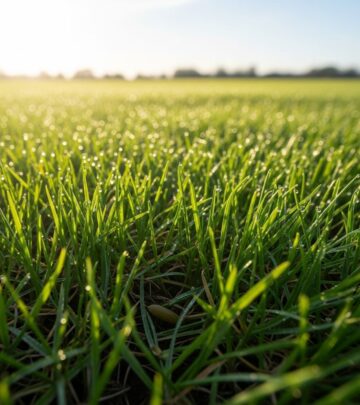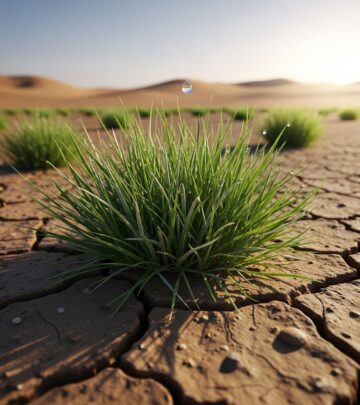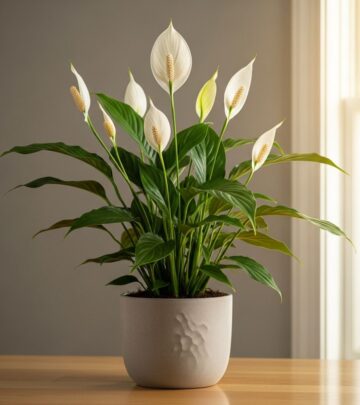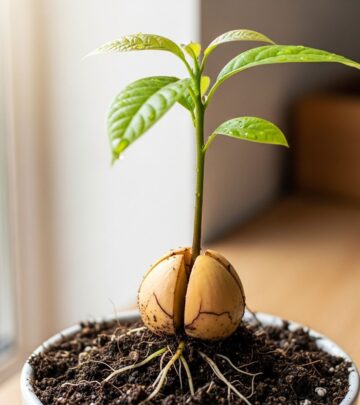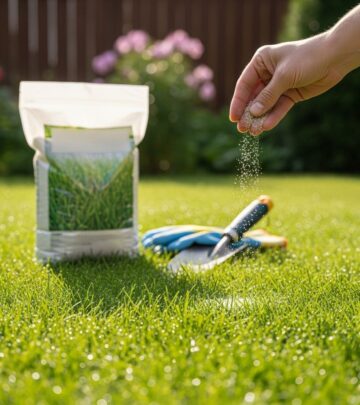Onion Companion Plants: Maximizing Garden Health with Allium Allies
Protect crops naturally while nurturing soil health and biodiversity.
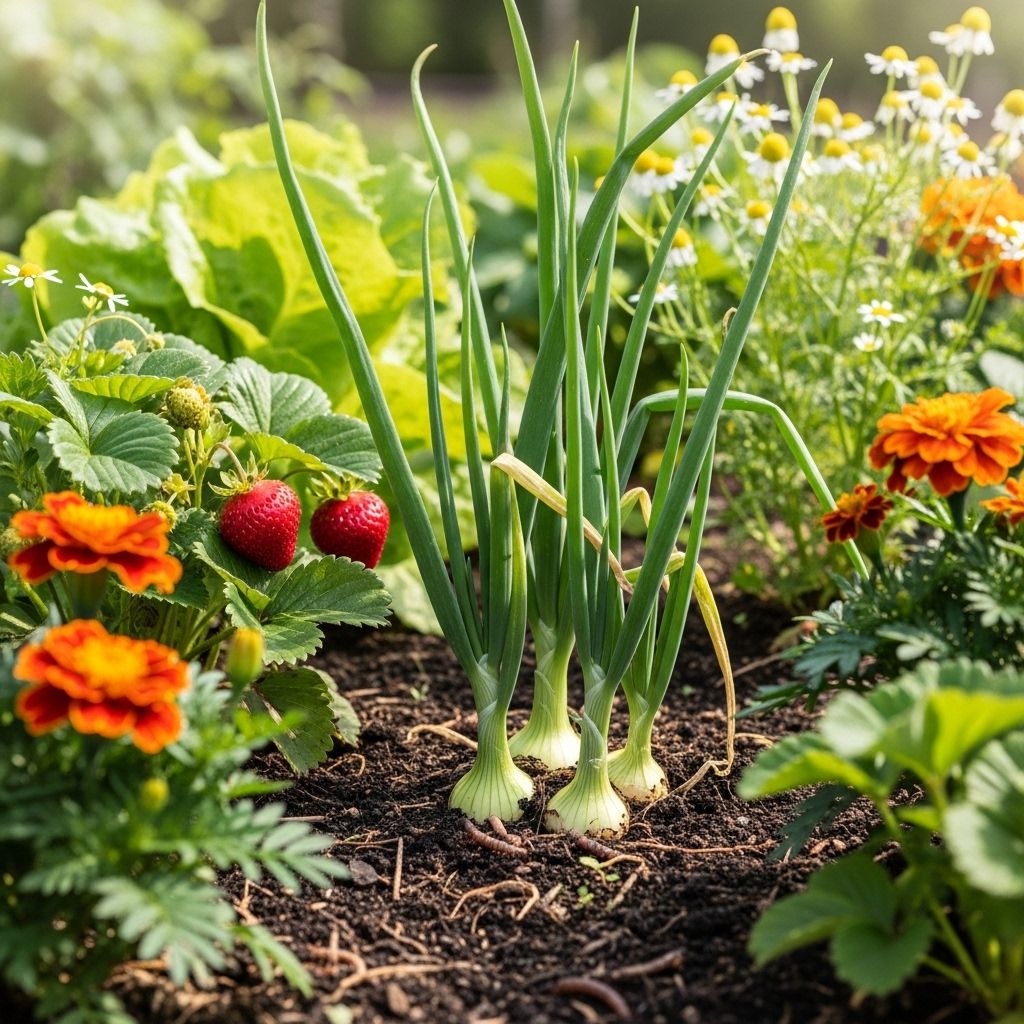
Onions have long held a valued place on the gardener’s planting calendar—not only for their culinary uses but also for their natural ability to repel pests and encourage healthy crops. Effective companion planting strategies with onions and their allium cousins (like garlic, shallots, and chives) offer a powerful way to boost vegetable garden productivity, reduce disease impact, and promote a thriving, diverse ecosystem in your backyard.
Why Companion Plant with Onions?
Companion planting is the strategic placement of different crops in proximity to achieve mutual benefits. Onions are renowned for their pungent scent and chemical properties, which deter many common pests and can even help prevent plant diseases.
- Pest deterrence: The sulfur compounds found in onions repel aphids, carrot flies, cabbage worms, and even rabbits, providing natural protection for themselves and their neighbors.
- Disease resistance: Certain pairings, such as onions with tomatoes, can help inhibit soil-borne diseases.
- Space and resource optimization: Onions have shallow roots and compact growth, allowing other crops with different needs to coexist in the same space.
- Increasing biodiversity: Integrating onions with a mix of flowers and herbs enhances garden resilience against insects, pathogens, and environmental stressors.
How to Plant Onions for Best Results
Onions thrive in full sun and require moist, well-draining soil. For home gardeners, using onion sets (small immature bulbs) is the easiest way to ensure robust, quick growth. Onions should not be planted too deeply, and as bulbs swell, keep the tops exposed to aid ripening.
- Mulch around onions to retain moisture and suppress weeds.
- Rotate onion crops annually to minimize disease buildup.
- Provide consistent watering but avoid soggy conditions.
- Harvest when tops yellow and fall over, then cure in a warm, dry place before storage.
The Best Companion Plants for Onions
Certain vegetables, herbs, and even flowers flourish alongside onions, helping to improve yields, ward off pests, and optimize space. Here’s a detailed look at the best allies for your onion patch:
Vegetables That Grow Well with Onions
- Carrots: Classic companions; onions deter the destructive carrot fly, while carrots help repel onion flies. Plant in alternating rows for best results.
- Lettuce: Lettuce benefits from the pest-repelling properties of onions and grows quickly, filling gaps in the onion bed.
- Tomatoes: Interplanting tomatoes and onions can help reduce soil-borne diseases and repel harmful insects like aphids and thrips.
- Strawberries: Onions keep pests away while strawberries act as a living groundcover, conserving soil moisture for both plants.
- Peppers: While not always the first choice, peppers can benefit from onions’ pest-repellent nature, especially against aphids and beetles.
Herbs That Make Great Onion Companions
- Chamomile: Known for its antifungal qualities, chamomile helps protect onions in humid gardens and attracts beneficial insects that prey on aphids.
- Dill, Summer Savory, and Parsley: These herbs attract pollinators and predatory insects, supporting the biological control of pests.
- Marigolds: Their strong fragrance and root secretions repel nematodes and various beetles, complementing onions’ defense mechanisms.
Flowers and Other Allium Allies
Many flowers and allium relatives offer both direct and indirect benefits to onions and other crops:
- Marigold: Repels a variety of pests and attracts beneficial insects, enhancing pest management and pollination.
- Garlic, Leeks, Shallots, Chives: Alliums support one another’s pest deterrence and can safely be grouped together, ensuring stronger bulbs and better yields.
| Companion | Benefits |
|---|---|
| Carrots | Onions repel carrot fly; carrots deter onion fly; root depth and growth habit compatible |
| Lettuce | Minimizes pest load; efficient use of space; shade for soil |
| Chamomile | Controls fungal disease; attracts beneficial predatory insects |
| Marigold | Repels nematodes, beetles; attracts pollinators |
| Garlic, Leeks, Shallots, Chives | Reinforces pest deterrence; boosts allium health and yields |
Boosting Orchard Health with Onions
If you’re managing a fruit orchard, container-grown onions are effective allies. Placing planters of onions with carrots and summer-flowering herbs such as marigolds and dill can deter aphids and Japanese beetles, protect buds, and provide bonus vegetables for the kitchen.
How Companion Planting Works: The Science
While some companion planting knowledge has been passed through generations of gardeners, modern science supports many of these practices:
- Research affirms: Biodiverse plantings create resilient gardens with stronger pest control and disease suppression.
- Marigolds and French marigolds: Documented to repel nematodes, reduce aphid infestations, and attract pest-eating insects.
- Nitrogen fixation: While beans and other legumes enrich soil nitrogen, they may compete too heavily with onions for nutrients when grown too close.
- Allelopathy: The chemicals exuded by onions can inhibit or promote the growth of nearby plants, making choice of neighbors important.
What NOT to Plant Near Onions
Despite their reputation as pest-fighters, onions don’t get along with every plant. Certain vegetables can inhibit onion growth or compete too harshly for the same nutrients. Avoid planting the following close to your onions:
- Beans and Peas (Legumes): Both groups fix nitrogen in the soil but are also shallow rooted, leading to competition for water and minerals during key growth phases. Growth can be mutually stunted.
- Asparagus: Its perennial root system and differing nutrient needs don’t align with annual onions.
- Sage: This strong aromatic herb is sometimes cited as inhibiting onion growth.
- Brassicas (Broccoli, Cabbage, Cauliflower): Alliums may inhibit the growth of brassicas and vice versa, especially in limited space gardens.
General Tips and Smart Combinations
- Pair onions and carrots in alternating rows to maximize mutual pest repellent effects.
- Interplant onions with lettuce for space optimization and natural shading for soil conservation.
- Include flowering herbs such as chamomile and marigold to bring pollinators and beneficial bugs.
- Use onion sets for reliable and vigorous starts, especially in spring plantings.
Frequently Asked Questions (FAQs)
Q: Can I grow onions and garlic together?
Yes. Garlic, onions, leeks, and similar allium plants thrive together and reinforce shared pest and disease resistance. Just ensure spacing is adequate to allow each bulb to swell and mature fully.
Q: How do onions improve nearby plant health?
Onions emit compounds that mask the scent of attractive crops (like carrots and lettuce), reducing the ability of pests to target these plants. They also discourage disease through antifungal and antibacterial components in their roots and foliage.
Q: Why shouldn’t I plant onions with beans or peas?
Onions and alliums are shallow-rooted and compete directly with beans and peas for water, air, and nutrients. This leads to reduced yields for both crops when planted in close quarters.
Q: Is companion planting with onions scientifically proven?
Yes, to a degree. Research supports the benefits of crop biodiversity and several well-known pairings, such as marigolds with vegetables and onions with carrots, for reducing pest pressure and increasing soil resilience.
Q: How do I space onions near their companions?
Space onions 4-6 inches apart, with companion crops occupying alternate rows or interspersed to maximize both yield and pest-reduction benefits without crowding. For leafy crops (lettuce, spinach) interplant between onion rows; for carrots, alternate in single rows.
Conclusion
Onions bring much more than robust flavor to your garden. When smartly combined with select herbs, vegetables, and flowers—and kept away from incompatible neighbors—the humble onion earns its title as a garden defender. Whether you’re seeking fewer pests, stronger plants, or simply more efficient use of your garden space, companion planting with onions provides sustainable solutions both the novice and veteran gardener can embrace.
References
- Epic Gardening: Onion Companion Plants
- Epic Gardening Help Center: Onion Growing Guide
- Companion Planting: Fad or Science?
- Science-Based Garden Combinations (YouTube)
- 8 Tips to Grow Onions, Garlic, Leeks (YouTube)
References
Read full bio of Anjali Sayee

